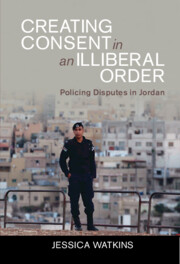Book contents
- Creating Consent in an Illiberal Order
- Cambridge Middle East Studies
- Creating Consent in an Illiberal Order
- Copyright page
- Contents
- Figures
- Maps
- Tables
- Preface
- Acknowledgements
- Note on Transliterations
- Abbreviations
- 1 Introduction
- 2 Strategic Alliances and Amalgamated Social Orders
- 3 State Policing, from the Ottoman Gendarmerie to the Public Security Directorate
- 4 Criminalising Disputes and Disputing Criminality
- 5 Policing Blood Crimes in the (Neo)Tribal Tradition
- 6 Policing Domestic Abuse
- 7 Community Policing After the Uprisings
- 8 From Neoliberal Securitised Policing Back to the Disputing Process
- Bibliography
- Index
- Books in the Series
8 - From Neoliberal Securitised Policing Back to the Disputing Process
Published online by Cambridge University Press: 02 June 2022
- Creating Consent in an Illiberal Order
- Cambridge Middle East Studies
- Creating Consent in an Illiberal Order
- Copyright page
- Contents
- Figures
- Maps
- Tables
- Preface
- Acknowledgements
- Note on Transliterations
- Abbreviations
- 1 Introduction
- 2 Strategic Alliances and Amalgamated Social Orders
- 3 State Policing, from the Ottoman Gendarmerie to the Public Security Directorate
- 4 Criminalising Disputes and Disputing Criminality
- 5 Policing Blood Crimes in the (Neo)Tribal Tradition
- 6 Policing Domestic Abuse
- 7 Community Policing After the Uprisings
- 8 From Neoliberal Securitised Policing Back to the Disputing Process
- Bibliography
- Index
- Books in the Series
Summary
Scholars of authoritarian resilience are often preoccupied with studying macro-events and institutions to explain regime durability. This book has, however, argued that studying the more mundane practices embodied in police management of common interpersonal disputes and problems can tell us much more about the social order that underscores regime survival, and about challenges to that order. This concluding chapter of the book considers the rise of ‘neoliberal securitised policing’ which has resulted from Jordan’s opening up over recent decades to globalisation and privatisation, and the increased importance the regime has accorded militant (and often Islamist) threats to national security. These trends clearly invite comparative and transnational analysis, but ultimately, it is argued, their iterations in the Jordanian context can be best understood at the micro-level, using a legal anthropology lens. The chapter also reiterates the utility of using a Gramscian framework to understand the construction, and undermining, of social order, in which a variety of strategies are used to arrive at consent.
Keywords
- Type
- Chapter
- Information
- Creating Consent in an Illiberal OrderPolicing Disputes in Jordan, pp. 199 - 212Publisher: Cambridge University PressPrint publication year: 2022



